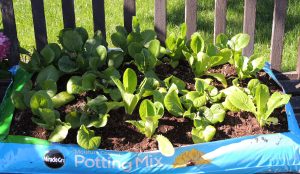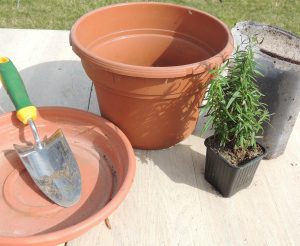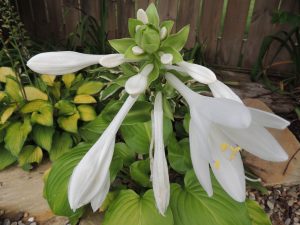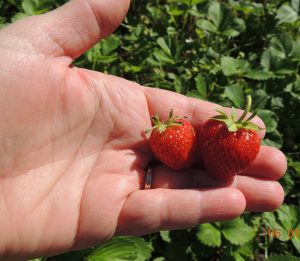Spring planting tips from experts help create thriving gardens
By Lynne Conner For Chronicle Media — April 5, 2017
For a quick container garden, poke drainage holes in the backside of a bag of soil while cutting a rectangular flap from the front. Plant lettuce or spinach in the exposed soil. (University of Illinois Extension photo)
Unpredictable spring weather doesn’t have to ruin your chances for beautiful, landscape plants or a thriving summer garden.
By following some tried and true tips from the University of Illinois Extension office, you can give your landscaping and garden a healthy advantage now, for strong, flourishing results this summer.
According to Sam Burbach, Winnebago County extension program coordinator, perennial plants and vegetable plants require different care and treatment in preparation for the summer growing season.
Burbach first recommends removing any mulch or dead plant material that covered the plant during the winter and pruning some perennials.
“If landscape plants haven’t been pruned, they can be pruned while they are dormant. Trees, fruit trees and shrubs should all be pruned before the new growth starts like in late March or early April,” she said.
Burbach warns against pruning flowering shrubs like lilac or forsythia bushes.
“I would wait until after a bush has flowered to prune it, otherwise, you will end up cutting off the flowering buds,” she said.
Rose bushes, Burbach said, require special care in the spring to ensure a proliferation of flowers in the summer.

Grocery store herb plants like rosemary can be transplanted and kept outdoors from late spring to early fall. (Photo by Lynne Conner / For Chronicle Media)
“Since most roses don’t bloom until summer, you can prune them in spring; March or April is an excellent time,” she said. “You can also mix in some fertilizer around the base of the rose bushes to help them take off once the warmer weather hits.”
Perennial plants like hostas, lilies and ornamental grasses can be planted and divided in the spring.
“In the spring, most perennials can be divided and transplanted, but you don’t want to transplant or divide peonies or irises, as they are early spring bloomers,” she said. “They prefer to be transplanted or divided in the fall. Ornamental grasses and day lilies can also be planted and or divided in the spring.”
Some varieties of flower bulbs like Oriental lilies, Asiatic lilies and begonias can also be planted in the spring and will flower in the summer.
“Most perennials do best being planted in spring,” Burbach said. “This gives their roots the most time to establish throughout the season. Some common perennials to try in this area would be: beebalm, black-eyed susans, asters, yarrow, coral bells, milkweed, coneflowers and phlox.”
Spring is also the perfect time to get a jump start on your herb or vegetable garden.
Burbach said that herb and vegetable seeds that have been planted indoors during the winter should be “tempered” before planting or growing them outside in the summer.
“Herb plants that have been wintered-over inside or tender vegetable plants should only spend a few hours per day outside in late April. The night-time temperatures could still be too cool for these plants and the drastic change in temps could shock and hurt the plants,” she said.
Burbach recommends tempering plants for about a week until planting them outside or leaving potted plants outdoors.
Preparing your garden’s soil for vegetable plants is also an important piece in building a successful summer garden. Soil testing is offered through the University of Illinois Extension office in Rockford as a way to determine what nutrients your garden’s soil might need.
“Soil testing kits are available at the Extension office free of charge and then there is an $18 fee for sending the sample in to be tested,” Burbach said. “Once you know what your soil might be lacking, then you can take steps to amend your soil and add those nutrients,” she said.
More information on soil testing is available at here at the U of I Extension.
Roto-tilling and the use of weed-blocking fabric can also help prepare garden soil for planting and cut down on invasive weeds during the growing season. Burbach says that although weed-blocking material provides some protection, air born seeds and bird droppings are also responsible for the spread of weeds.
“New weeds in a garden sometimes crop up as a result of bird deposits or from a strong wind that carries seeds into your garden,” she said. “An alternative to weed blocking fabric is to use a couple of layers of old newspapers to help prevent weeds in your garden. Roto-tilling your garden definitely helps to break up the soil, but you might inadvertently churn existing weeds into your garden.”

Hostas are among perennial plants that can be divided and transplanted in the spring. (Photo by Lynne Conner / For Chronicle Media)
Another popular gardening trend is container gardening. Whether you have limited mobility or limited space, container gardening provides the benefits of fresh produce without the work of traditional gardening.
According to Burbach, lettuce, spinach, strawberries and some varieties of tomatoes and peppers grow well in container gardens.
“Lettuce doesn’t need too much root area and the roots tend to grow out rather than straight down, so this is a great candidate for a container garden,” she said. “Herbs do well in container gardens as do strawberries. Strawberries in a traditional garden tend to spread and become somewhat invasive, so, it’s almost better to have strawberry plants in a large upright container with several side openings. The advantage to this arrangement is that the berries are not lying on the ground where they could rot.”
Container gardening using a raised bed promotes better plant drainage and, by its design, deters animal visitors. She warns against planting root vegetables like carrots, potatoes or turnips in a container setting as these plants need more space and depth than a container can provide.
“Some people even grow blueberries in a container garden. Since blueberries are a woody stem plant, you would need to bring those inside a garage during winter because they are not as protected in a container as they would be if planted in the ground,” she said.
The University of Illinois Extension office has several resources for area gardeners including “Four Seasons Gardening” a free live spring gardening webinar set for April and the free Master Gardener Helpline which starts in April and runs on Mondays and Wednesday from 9 a.m. until noon.
You can reach the Helpline by calling (815) 986-4357. For more information or to register for U of I Extension seminars visit their website at: web.extension.illinois.edu or call (815) 986-4357.
— Spring planting tips from experts help create thriving gardens —








